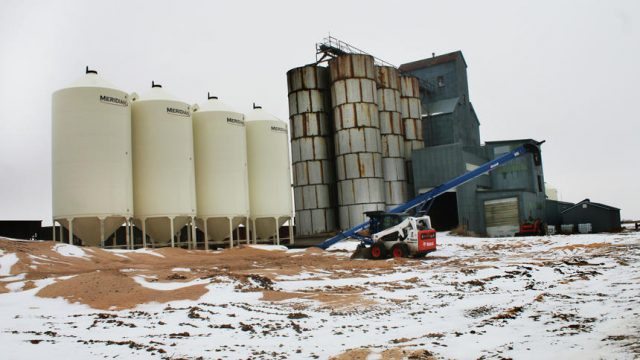Commissioner Fedorchak: Stop Pointing Fingers and Fix the Program

Part of a pile of yellow peas lays under snow on the ground at the Tunbridge, N.D., one of the sites of the NoDak Grain, headquartered at Devils Lake, N.D. Photo taken Nov. 20, at in rural Rugby, N.D.
This guest post was submitted by North Dakota Public Service Commissioner Julie Fedorchak, a Republican who has served in that office since 2012.
When bad things happen to good people, human nature sends us looking for someone to blame.
The PSC has been that “someone” in a recent grain dealer insolvency case that threatens 43 producers and 17 grain dealers with millions of dollars in losses.
In reality, fingers of blame can point in many directions for the current weak protections of the grain-licensing program. This most certainly includes leadership of the North Dakota House and the House agriculture committee. They have consistently rejected measures the PSC has proposed in the last three sessions to strengthen protections for producers and grain sellers under our licensing program.
In 2015, we asked the Legislature to strengthen our ability to keep financial information collected during our onsite reviews of grain facilities confidential. This would help us detect red flags in advance and minimize losses. Quite honestly, this was a simple but meaningful statutory fix. The Senate passed the bill. The House rejected it.
In the process, the North Dakota Grain Dealers Association and several prominent House members scolded the PSC in committee hearings, saying that the PSC should not be looking at the financials–that’s the job of the bonding companies.
[mks_pullquote align=”right” width=”300″ size=”24″ bg_color=”#ffffff” txt_color=”#000000″]…until you fix the shortcomings of the program with tools that address the realities of today’s agriculture marketplace, producers and grain sellers will continue being devastated by insolvencies. [/mks_pullquote]
How well did that work out for the producers who sold to Hunter Hanson in this latest insolvency? He was bonded with A-rated agencies.
Last session, on the heels of two agency general fund budget allotments and a required 10 percent budget cut, we proposed a legislative package to provide better protections for producers at a lower cost to the general fund. This included expanding the safety net called the indemnity fund to cover all grain sales, cash or credit.
The Senate approved it. The House Ag committee rejected it.
This session the Senate again approved a voluntary cash-sale indemnity fund, and last week the House Ag committee amended it out of the bill despite support from the North Dakota Corn Growers, North Dakota Soybean Association, U.S. Durum Growers and the North Dakota Bankers Association.
Ultimately, producers are the ones being hurt. If House agriculture leaders had acted with the Senate last session to support a cash-sale indemnity fund, claimants in the current Hunter Hanson insolvency would recover 80 percent of their losses.
So now we are at a pivot point. The House has voted to move the program to the Department of Agriculture. For those who want to believe the PSC is the problem, this is comforting action. “Someone has to pay,” I’ve been told multiple times by House Ag Chairman Dennis Johnson.
Very good. Take your pound of flesh and declare victory. But the reality is, until you fix the shortcomings of the program with tools that address the realities of today’s agriculture marketplace, producers and grain sellers will continue being devastated by insolvencies.
We say this not as a rash judgement, but after much careful study. The solutions we have consistently offered come working in the trenches with the tools we have – the licensing process, bonding requirements, and inspections – all of which we have attempted to enhance in the last six years. Our recommendations are also informed by our experience serving as the trustee in multiple grain insolvencies when the resources available to make farmers whole all too often fall miserably short.
This Legislature has taken one important first step to that end. The House finally joined the Senate to provide the confidentiality for grain licensee financial information that we requested four years ago. Now I urge them to support a cash-sale indemnity fund. Make it voluntary, make it an opt-in fund if that’s more tolerable.
But listen to producer groups like the corn growers, soybean growers, durum growers who want this option. They recognize that with the huge volumes sold and transported by elevators and roving grain buyers today, any agency staffed with a handful of inspectors will be challenged to keep track of the books of 400 facility based and roving grain buyers operating throughout North Dakota.
It is high-time we quit pointing fingers, check egos at the door and roll up our sleeves to develop the strongest possible grain licensing program for our state’s leading industry before the 66th Legislature adjourns.




